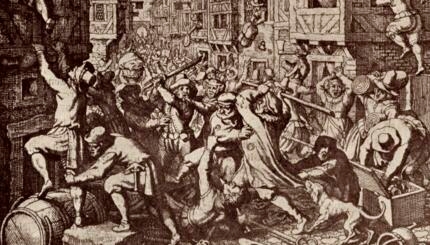I still have mixed feelings about Kaparot
On one hand, the pre-Yom Kippur ritual where we transfer our sins onto some unsuspecting other is completely spiritual. We’re purging ourselves — but, more than that, we’re taking the bad parts from ourselves and doing some good with it. By transferring our sins to a five-dollar bill (me) or a chicken (the in-laws) and then giving it to a poor family for Sukkot dinner, we’re embodying all three stages of repentance in one: teshuvah (saying we’re sorry), tefilah (praying), and tzedakah (charity).
On the other — well, what did that poor chicken do to you?
Read the rest of my kapparot commentary from last year — and check out some righteous photos of Hasidim and chickens — right here.
Sukkot
Pronounced: sue-KOTE, or SOOH-kuss (oo as in book), Origin: Hebrew, a harvest festival in which Jews eat inside temporary huts, falls in the Jewish month of Tishrei, which usually coincides with September or October.
teshuvah
Pronounced: tuh-SHOO-vah, (oo as in boot) Origin: Hebrew, literally “return”, referring to the “return to God” teshuvah is often translated as “repentance.” It is one of the most significant themes and spiritual components of the High Holidays.
tzedakah
Pronounced: tzuh-DAH-kuh, Origin: Hebrew, from the Hebrew root for justice, charitable giving.


